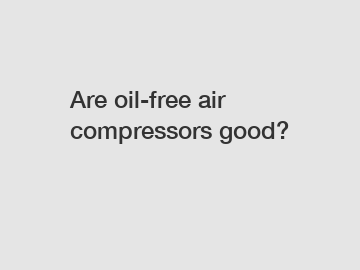Are oil-free air compressors good?
Oil-free air compressors have gained popularity in recent years as a cleaner, more efficient alternative to traditional oil-lubricated compressors. But are they really as good as they claim to be? In this article, we will explore the benefits and drawbacks of oil-free air compressors to help you make an informed decision for your industrial or commercial needs.
First and foremost, oil-free air compressors offer a cleaner working environment. Since they do not require oil for lubrication, there is no risk of oil spills or contamination of the compressed air. This can be especially important for industries where cleanliness is paramount, such as in food and pharmaceutical manufacturing.
Another major advantage of oil-free air compressors is their lower maintenance requirements. Oil-lubricated compressors need regular oil changes and filter replacements to keep them running smoothly. With an oil-free compressor, you can save time and money on maintenance costs, as there is no need to monitor oil levels or replace filters.

In addition to being cleaner and more cost-effective, oil-free air compressors are also more energy-efficient. Because they do not have to work against the resistance of oil, they can operate at higher speeds and deliver more compressed air per horsepower. This means lower energy consumption and reduced operating costs in the long run.
Furthermore, oil-free air compressors are also more environmentally friendly. Traditional oil-lubricated compressors release oil vapor into the air, contributing to pollution and harming the environment. By using an oil-free compressor, you can reduce your carbon footprint and do your part to protect the planet.
Despite these advantages, oil-free air compressors also have some drawbacks that you should be aware of. One of the main concerns with oil-free compressors is their durability. Without proper lubrication, the internal components of the compressor can wear out faster, leading to more frequent repairs and replacements.
Additionally, oil-free compressors tend to be noisier than their oil-lubricated counterparts. This can be a significant drawback for workplaces where noise levels need to be kept to a minimum. If noise is a concern for your operations, you may need to invest in sound-dampening equipment or consider alternative compressor options.
Another potential downside of oil-free air compressors is their higher upfront cost. Oil-free compressors tend to be more expensive than oil-lubricated models due to the advanced technology and materials required to manufacture them. However, the long-term savings on maintenance and energy costs may outweigh the initial investment for many businesses.
In conclusion, oil-free air compressors offer a range of benefits, including a cleaner working environment, lower maintenance requirements, higher energy efficiency, and reduced environmental impact. However, they also come with some drawbacks, such as lower durability, increased noise levels, and higher upfront costs.
Ultimately, the decision to invest in an oil-free air compressor will depend on your specific needs and budget. If cleanliness, energy efficiency, and environmental sustainability are top priorities for your business, an oil-free compressor may be the right choice for you. However, if noise levels, durability, or upfront costs are major concerns, you may want to consider other options.
Regardless of your decision, it is important to do thorough research and consult with industry experts before making a purchase. By weighing the pros and cons of oil-free air compressors, you can make an informed choice that will benefit your business in the long run.
Are you interested in learning more about vane air compressor, low pressure vane compressor, heat recovery from air compressors? Contact us today to secure an expert consultation!



